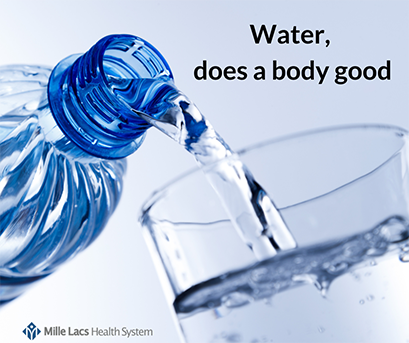Water does a body good
June 26, 2023
Whether you're planning to go swimming, hiking, or just spend more time outside this summer, wherever you go, don't forget to prioritize hydration.
Drinking water can prevent dehydration, a condition that can cause unclear thinking, result in mood change, cause your body to overheat, lead to constipation, kidney stones, and more.
The human body is made up of about 60% water, and when it starts to heat up, it will draw upon that to form sweat. Then, when the sweat interacts with the hotter body temperature, it evaporates, creating a cooling sensation.
Because it's significantly hotter in the summer, your body will naturally sweat more often, so fluids need to be replenished more frequently. The more time you sweat, the higher your chances of developing dehydration.
Additional times when the body needs more water include: when being physically active, when running a fever, or having diarrhea or vomiting.
If you're feeling thirsty and your mouth is a little parched, that's when you should drink; this is a very early sign of dehydration. After that, another early sign is a darker yellow urine color; ideally, it should be a very pale yellow.
As your hydration levels start to deplete, you may feel drowsy, light-headed, and your overall cognition will be diminished. Poor coordination may follow or accompany that. Heart palpitations are another possibility. In these cases, the first thing is to try to hydrate on your own; however, if drinking water doesn't seem to help, seek medical attention so that fluid can be reintroduced intravenously.
At the very least, the amount of water you should drink should be about half your body weight's worth in fluid ounces; this assumes you're measuring body weight in pounds. For example, if you weigh 150 pounds, then you should drink at least 75 fluid ounces of water per day.
The easiest way to get the water you need is to make it part of your daily tasks. For example, have a glass in the morning before brushing your teeth and again before bed. Then, have a glass or two with every meal. Don't forget to sip a little bit throughout your day every two hours or so.
One last way to increase fluid intake is to “eat” your water. Melons, celery, tomatoes, cucumber, and citrus are all excellent sources to boost hydration.
